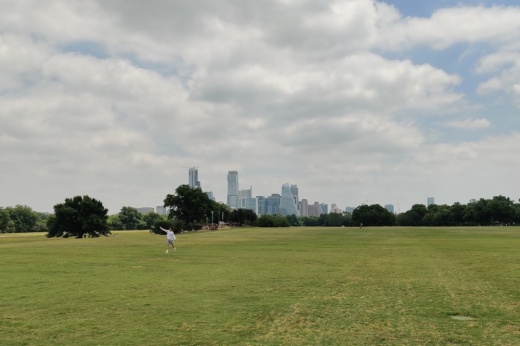The backstory
The Zilker Park Vision Plan, the first-ever comprehensive plan for Austin's landmark 351-acre downtown park, was pulled together over recent years in response to Zilker becoming "loved to death," according to city parks staff. The plan calls for various strategies and improvements to manage Zilker as Austin grows and the park experiences more use, and strain.
Since late 2020, thousands of Austinites weighed in on the plan as it moved through several rounds of community input and editing. Draft versions of the plan compiled by Design Workshop have recently been up for consideration by multiple city boards and commissions as it heads toward a council vote.
The parks board's 7-3 vote early on May 23 supporting council adoption of the Zilker plan followed other favorable recommendations made this year by the civic bicycle and pedestrian advisory councils, the Urban Transportation Commission, the Environmental Commission and the Design Commission.
“This project’s been among one of the most challenging, but it’s also been one of the most critical and urgent endeavors that this department has taken on, at least in my tenure," Parks and Recreation Department Director Kimberly McNeeley said May 22. "This plan today is the best representation of concepts, plans, principles, direction, community feedback that we have been able to study and combine into a single document for your consideration, review and recommendation.”
The plan will next be looked over by a council committee in June before it's up for approval by the full council dais in July.
The details

The Zilker vision plan lays out goals for the park's future with several management strategies and potential improvement projects the city could take on over the years ahead. None of the elements included in the plan are finalized; each would come with further public engagement, city analysis, design work and cost estimates if they move forward.
The plan suggests wide-ranging changes to mobility around the park, proposes environmental projects and facility additions, and lays out potential updates to the park's oversight.
Some top transportation changes proposed include:
- Removing two lanes of traffic on Barton Springs Road
- Closing several roadways to vehicle traffic and converting them to bike and pedestrian routes
- Removing "informal" parking in the Butler Landfill and Polo Fields areas for natural restoration
- Removing most surface parking, and potentially adding parking garages in and around Zilker to concentrate vehicle traffic
- Running shuttles both to and from downtown and within the park
- Building a land bridge over Barton Springs Road
- Relocating the Hillside Theater to the Great Lawn
- Building new bike and pedestrian bridges across Barton Creek and Lady Bird Lake
- Building a welcome center facility near Barton Springs
- Adding new playgrounds throughout the park
The full draft vision plan may be viewed here.
Meeting highlights

While it's received general support from Austin's boards and commissions this spring, the plan has generated vocal pushback from many community members and resident groups over its various proposals and their possible impacts on Zilker.
“Admittedly, not everybody agrees. We know that. But I assure you that the team tried to take the best of everything and make it into something that you could consider with confidence and that you could consider as part of something that is needed by the city. We need to have a plan for this park because of its enormous popularity and its enormous use," McNeeley said.
Most Austinites testifying through about 3 hours of public comment during the parks board's May 22 meeting—the plan's final stop before moving on for council approval—stated their opposition to the vision plan.
Dozens of speakers shared concerns over the proposed projects bringing negative environmental and climate outcomes; the park's commercialization; the need for certain features, such as the theater relocation; park accessibility; respect for the property's history; public involvement; the nonprofit management structure; and more.
A smaller share of speakers spoke in support of the plan, with some citing a need to get a long-range vision for Zilker in place given the park's deterioration amid overuse. Several also said the plan's proposals would end up helping, rather than harming, Zilker's ecology.
All commentary from the meeting may be viewed here.
Debate over the plan's merits extended to the parks board, with members spending several more hours going over details and requesting various changes to the board's draft recommendation.
The board considered more than a dozen edits brought by multiple commissioners before eventually voting 7-3 in favor of the plan.
A request for a parking and traffic study before any relevant projects move forward, seeking coordination with Capital Metro and Project Connect leaders on transit access, focusing on natural restoration along Zilker's waterways, and requiring annual reporting by the parks department on the vision plan's progress were among the featured amendments.





